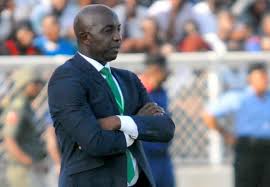November 2 – FIFA has won the dismissal of a lawsuit by former Nigeria coach Samson Siasia in a New York court, after Siasia challenged his match-fixing ban.
Siasia (pictured), who was a striker for Nigeria’s national team before turning to coaching, now lives in Atlanta. His challenge to FIFA’s lifetime ban – which was later reduced to five years after an appeal to the Court of Arbitration for Sport – claimed it was a violation of his rights under the U.S. Constitution, federal civil rights law and state law.
He said the case against him was based on “grossly insufficient evidence” consisting exclusively of emails that were “never explained”, and which he was never allowed to cross-examine.
U.S. District Judge Alvin Hellerstein ruled Siasia had “no conceivable basis” to exercise jurisdiction in Manhattan federal court because the dispute took place outside the United States and was decided under Swiss law.
In June, the Court of Arbitration for Sport shortened Siasia’s ban and lifted his 50,000 Swiss franc ($54,585) fine, calling the lifetime ban too severe for a first offense.
Siasia’s life ban for bribery related to match-fixing had been reduced to five years in June by the Court of Arbitration for Sport (CAS) which argued he did not profit from his misdemeanor.
CAS ruled that the ban, imposed by FIFA in April 2019 after Siasia was found guilty of agreeing to join a match-fixing ring masterminded by notorious Singaporean Wilson Perumal nine years earlier, was “disproportionate”.
Siasia was caught after a wider investigation involving Perumal, who confessed to international match-fixing. He was initially banned for agreeing to “receive bribes in relation to the manipulation of matches.”
Detailing the case, CAS said: “In 2010, a match fixer tried to involve Mr Siasia as a coach of a club under his strict instructions. With the promise of employment benefits, Mr Siasia would have had to always field several players under the control of the match fixer. The negotiations between the match fixer and Mr Siasia in relation to the conditions of employment were conducted by email over a period of two months. Eventually, the club did not accept or could not afford Mr Siasia’s requests and the negotiations ended.”
Ruling on his appeal, CAS upheld the guilty verdict but reduced the length of the ban and also overturned a FIFA fine of CHF 50,000.
Siasia, who led Nigeria to silver and bronze medals at the 2008 and 2016 Olympics ascoach, previously had a notable playing career including scoring Nigeria’s goal in a 2-1 defeat by Argentina at the 1994 World Cup – the fixture after which Diego Maradona infamously failed a doping test.
The former striker played 51 times for Nigeria, and won a French Championship medal with Nantes in 1995.
In its ruling, CAS judges said the imposition of a life ban was “disproportionate for a first offense which was committed passively and which had not had an adverse or immediate effect on football stakeholders.”
Siasia’s ban expires in August 2024.
Contact the writer of this story at moc.l1745642186labto1745642186ofdlr1745642186owedi1745642186sni@n1745642186osloh1745642186cin.l1745642186uap1745642186
